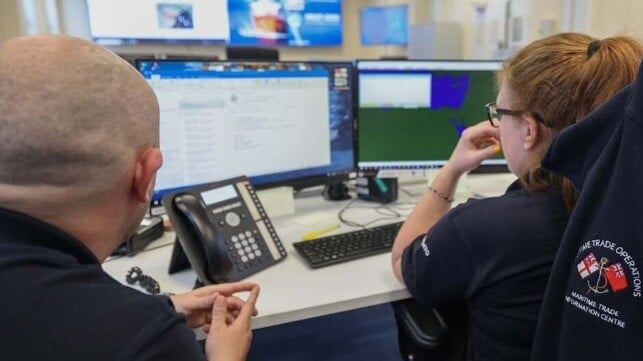RED SEA
"You Can Hear the Gunfire": The 911 Call Center for Mariners Under Attack

A Royal Navy-led emergency center has dealt with an ‘unprecedented’ rise in distress calls due to the Red Sea crisis.
The team at the UK Maritime Trade Organisation, based on Portsdown Hill overlooking Portsmouth, has dealt with two or three reports of attacks and incidents daily – compared with monthly – as a result of the wave of attacks on shipping in the southern Red Sea and Gulf of Aden since November.
For the first time the UKMTO opened the doors of its headquarters to shed light on the efforts of its small team – just 18 strong – to help terrified or distressed sailors, guide other vessels to help out (or avoid the area) and work with international shipping companies to keep trade flowing.
The 24/7/365 operations room acts as the 'call center’ for shipping of any nationality in the Gulf, Red Sea and central/northern Indian Ocean.
The UKMTO’s operators – no more than five personnel at any one time – monitor thousands of ships moving across an area ten times the size of the North Sea, as well as a similar size of the Atlantic Ocean focused on the Gulf of Guinea which has suffered piracy and criminal activity, though not to the same extent.
They’ve seen a 475 percent increase in incidents reported by seafarers in the Middle East since attacks began in the autumn, with over 2,500 emails coming into the HQ daily.
Despite the concerted efforts by international warships to protect commercial traffic in the Red Sea and Gulf of Aden and frequent downing of drones and missiles, including by HMS Diamond and Richmond, more than a dozen merchantmen have been hit and one, the bulk carrier Rubymar, sunk by Houthi attacks in recent months.
“There are times when we take a call from very distressed mariners as an attack is taking place – for them it’s a potentially life-changing moment,” said Lieutenant Commander Joanna Black. “You can hear the gunfire, perhaps banging or an explosion – it’s real time and you can see from the look on the team’s faces what is happening. We are rooting for the seafarers and do everything we can for them. We take a great deal of pride in being able to help people in their hour of need – we are the only organization who do what we do.”
Former sailor Darren Longhurst, now a watchkeeper, said the tempo in the operations room “has gone up to 200mph” since the attacks began in mid-November.
“It’s a big adrenaline rush when they call in,” he explained, “but you’re here to calm the master or whichever member of the crew is calling, calm them down as best as you can, and try to assist them in the best possible way you can considering you’re a fair way away from them.”
The team call every vessel registered with the UKMTO – many smaller fishing vessels operating in the same waters are not – within a 20 to 50-mile radius of an incident, either to ask them to assist, or to warn them of the danger.
Trade passing through the Red Sea has dropped by nearly one third as a result of the attacks with liquefied gas carriers in particular avoiding the route due to their flammable cargoes.
The increased traffic taking the longer route to Europe and the Americas sailing down the eastern seaboard of Africa means higher costs and longer waiting times for goods.
It also means ships sail down the Somali coast for around 1,000 miles – a possible lure to pirates and criminal gangs.
“The current focus of industry and military in theatre is on a possible resurgence of Somali-based piracy at extended range – 600 nautical miles – from shore,” Lieutenant Commander Black added. “Although this could have a significant impact on ships, it’s expected that international trade will adapt by re-routing to avoid the danger areas.”
Whether under attack by pirates or Houthi drones, or suffering from a fire or serious injury, seafarers are encouraged to call the UKMTO in an emergency – irrespective of their nationality – and the team will coordinate a response.
Set up in the wake of the September 11 atrocities in 2001, the UKMTO also has a regional center in Dubai – its personnel visit ships in the Gulf, brief crews and discuss the big picture with industry leaders.
“We’ve become the equivalent of an international 999/911 organization for commercial shipping in the region. There is no other organization which does what we do – informing, responding, and reassuring; we’ve become trusted and respected by mariners as the central point of contact for conflict and piracy-related emergencies in the region," said Lieutenant Commander Black.
The opinions expressed herein are the author's and not necessarily those of The Maritime Executive.
No comments:
Post a Comment